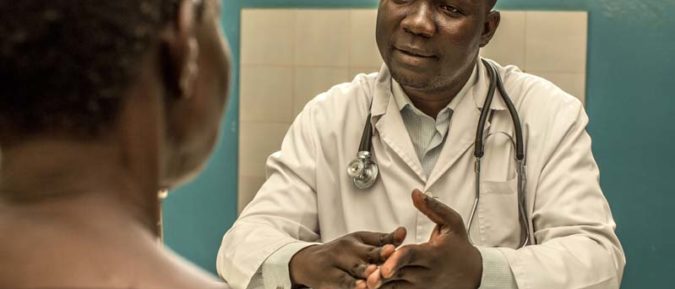The Department of Internal Medicine provides professional services to patients needing diagnosis, treatment, and management of diseases and conditions related to the internal organs and systems of the body. Internal Medicine sub-specialties include:
- Infectious Diseases
- Pulmonology.
The department is comprised of an 84-bed capacity Main Ward, a 30-bed TB ward, and a 20-beds Isolation Ward.
Other departments we work closely with include;
- The Adult Outpatient Department
- The HIV/AIDS Clinic
- The Medical Emergency Unit
- The Private Clinic
Our team comprises two physicians, two medical officers, four intern doctors and, on average, 18 nursing staff.
The Internal Medicine department runs 24 hours a day, seven days a week.
What we do
- Admission and treating adult patients, both male and female.
- Critical Care or high dependency unit with 8 beds.
Disease spectrum
We mainly treat infectious diseases, such as Malaria, Tuberculosis and HIV/AIDS, Hepatitis B, Community acquired Pneumonias, Urinary tract infections.
Recently, there has been an increase in the number of Non-Communicable Diseases (NCD) with Hypertension and its complications, Diabetes, Cancers, Liver Cirrhosis being the leading conditions. The prevalent children’s conditions which are treated on our ward are Sickle Cell disease, Rheumatic heart disease and Renal failure.
Sickle cell anaemia in children is highly prevalent and a leading cause of death. Children are usually diagnosed with Sickle cell at the age of 4 months. They receive treatment and counselling here, even into adulthood.
Services
- Clinical bedside diagnostic and treatment
- Palliative care for terminally ill patients
- preventive health services
- Counselling
- Bedside teaching of medical and Nursing students
- Basic simple surgical procedures such as tissue biopsies (skin bone marrow and Lymph node, pleural biopsies) are also carried out.
- We also offer some non-invasive diagnostics including ECG and Spirometry.
- We also serve as an internship site for newly qualified young doctors and nurses to come and practice their medical skills.
- We are a research site in collaboration with Gulu University and to the Ministry of Health.
Challenges in healthcare
Diagnosis and treatment of Cancers (especially HIV associated cancers) is the biggest challenge our department is facing. We are able to treat definitively some Haematological cancers, but access to high quality drugs for management of other more complex cancers is a an area of concern that we are working on.
Hepatitis B associated Liver cirrhosis is another condition that challenges us due to the high cost of drugs and diagnostics.
PROJECTS IN THE PIPELINE
Our aim now is to improve on Non Communicable Disease diagnostic and treatment capacity, especially for Cancers, so that patients do not have to travel to Kampala for diagnosis and treatment.
To better serve our region, we are aiming at strengthening our local student teaching and training capacity, with the intention of becoming a Medical Centre of excellence.

